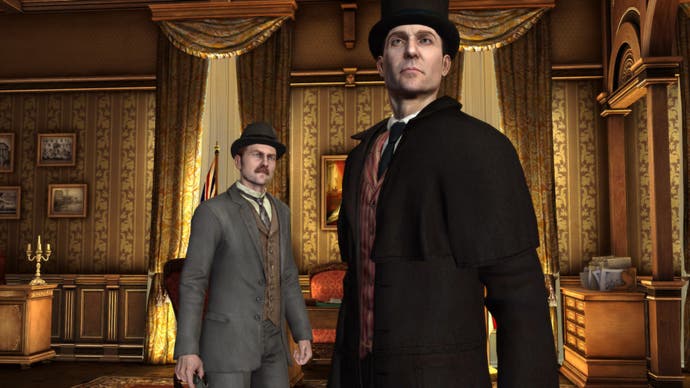The first fandom
The Mage of Reason.
The human intellect! It's an omnivorous Thing Engine that chews up anything fed to it and spits out the useful and the beautiful. You plug a disease in one end, you get a cure; you plug in ideas, you get a story; you plug in the universe and you get physics, smartphones, lasers. Everyone loves lasers.
But what happens when you take things that the intellect has spat out and put them back in? What happens, for instance, when you feed it a story? Plug in the Lord of the Rings and you get debates about whether the first dragon, Glaurung, was built wholesale by Morgoth or perverted out of a snake. Plug in Game of Thrones and LOTR, and you get debates about whether Smaug could take Balerion in a fight. In short, you get fandoms.
But fandoms are relatively new, as far as the history of the human intellect is concerned. Older than smartphones, more recent than steam power. Last month I talked about how HG Wells popularised turn-based wargaming; this time I want to talk about how Sir Arthur Conan Doyle caused fandom.
Sherlock Holmes was the first fictional character who was treated like a real individual... even while the fans knew he was fictional. Of course there were people who didn't realise he was fictional, too. Holmes was supposed to have written a monograph about the differences between the ashes of a hundred and forty different types of tobacco. As long ago as 1890, Conan Doyle wrote that a tobacconist had contacted him to ask for a copy of the monogram. There were people who tried to contact Holmes for help with cases, visitors to Baker Street looking for his flat, all that. But I'm not talking about those: I'm talking about the fans.

The hardcore Holmes fandom is over a hundred years old. Back in 1911, the theologian and detective fiction writer Ronald Knox published an essay, 'Studies in the Literature of Sherlock Holmes'. He analyses the Holmesian literature using the same approaches some scholars used to analyse authorship of the New Testament. He pointed out that Holmes before and after the duel with Moriarty at the Reichenbach Falls is different in subtle, important ways. He speculated that Holmes had in fact died at Reichenbach. Knox finds evidence in the earlier stories that Watson was a spendthrift. He suggests that after Holmes' death, Watson had invented the later Holmes stories.
Knox knew perfectly well why the pre- and post- Reichenbach discrepancies occurred. It was because Conan Doyle got sick of writing Holmes, killed him off, and came back to him eight years later. But he had a lot of fun writing the essay. Over the years that followed, scholars and writers took up 'the Great Game' - the hobby of pretending that Holmes was real in order to hypothesise details about his personal life, or resolve anomalies. They took it very seriously. They had tremendous fun. They plugged Sherlock Holmes into their intellects, and intense essays about the probable details of Holmes' family life came out, or the way Watson's war wound seemed to migrate round his body.
By 1934 the hobby was popular enough that enthusiasts founded both the Sherlock Holmes Society (in the UK) and the Baker Street Irregulars (in the US). The Irregulars went as far as to claim that Conan Doyle was fictional, or at most Watson's literary agent. The Doyle estate, never famous for their sense of humour about their intellectual property rights, sent them outraged lawyers' letters, which I imagine only delighted the Irregulars the more. It was probably the Irregulars who first used the word 'canon' in the fannish sense. Canonical writings were the Holmes stories; Conanical writings were non-fiction about Conan Doyle.

So why did the Holmes stories catch fire in this way - how did educated people start treating him as if he were real, even when they knew he wasn't, in a way that seemed entirely new? Michael Saler - whose very fine book with the very daft title 'AS IF: A Literary Prehistory of Virtual Reality' I got a lot of this from - points out that Holmes' superpower is intellect. Not the dull antiseptic sort of intellect that powers accountancy and pragmatism, but a vibrant, artistic sort of rationality. At one point Holmes claims that his grandmother was the sister of the French artist Vernet (probably Horace, the more recent one who painted battles, not Claude Joseph, the older one who painted sea scenes - but we never find out how old Holmes is, do we?). "Art in the blood is liable to take the strangest forms," Holmes says.
So - Saler reckons - at the end of the nineteenth century, when it looked like human reason had killed all the interesting gods and fairies and whatnot - here's Holmes, who's, like, an avatar of reason but uses it in sexy unexpected ways to solve crimes and make the world a more interesting place. More, it's not just talent, it's a method. It's something anyone could learn, the stories suggest. It's something you might be tempted to try. GK Chesterton wrote this about the public response to Holmes: "it is a good thing that the average man shall fall into the habit of looking imaginatively at ten men in the street even if it is only on the chance that the eleventh might be a notorious thief."
WHAT HAS THIS GOT TO DO WITH VIDEO GAMES okay hold your horses. It's this. I started out talking about the human intellect, and how we all respect it for being great at making lasers. But we think of intellect, too, as something dry and severe and sterile and grown-up. Holmes, and the Holmesians, show us intellect at its most playful.
Video games are made of code - made of rules. They're mechanical, predictable, rational objects. But they permit a pure and delightful form of play - and they allow for other, more sophisticated and social forms of play still. They generate fandoms and co-operation and elaborate, ingenious shared online enterprises. They're what you get when you plug undiluted nerdery into the human intellect. But when you plug the human intellect back into them, something wonderful happens.

